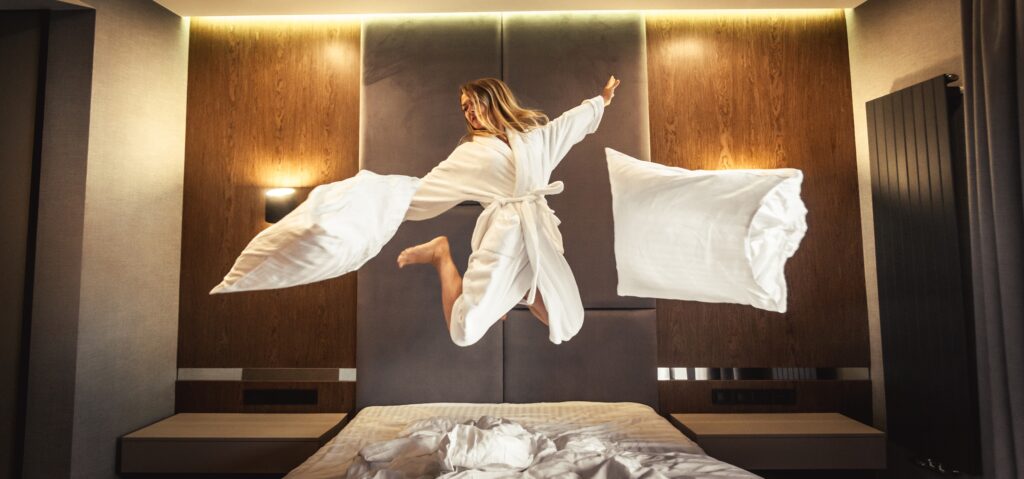
You have them in all shapes and sizes and they all guarantee the best deals. But who do you do business with and who don’t? What if the system suddenly stops responding or if a sofa bed goes bankrupt? Do you go for quality and money or do you choose the party with the best savings system? What impact do bed sofas have on the travel industry and how are they transforming the market? The world of sofa beds is changing rapidly. Where previously the focus was on beds only, sofa beds now offer many up- and cross-sell products. In the past, there was almost only direct contact between accommodation and tour operator, with the tour operator processing these into packages and selling them through the travel agencies. Travel agents have had access to bed banks for years now, which makes comparing ten or more parties with the current systems a lot easier.
Consolidation & Technology
The use of technology by sofa beds has not only improved efficiency but also revolutionized the way they do business. The integration of advanced booking systems has enabled travel agents to compare and book offers faster and more accurately. In addition, bed banks have used big data and analytics to gain insights into consumer behavior and market trends. This allows them to offer dynamic pricing and better respond to supply and demand. Additionally, bed banks have adapted to mobile technologies, allowing travel agents and consumers to access their services on the go. This means they can respond flexibly and quickly to changing circumstances, such as last-minute bookings or cancellations. The investment in mobile apps and responsive websites has significantly improved the accessibility and user-friendliness of sofa beds. 
Specialisation
There is a trend in which bed sofas are embracing more and more boutique hotels, instead of just focusing on large chains. Bed sofas that specialise in a destination often have direct contracts and therefore offer a distinctive offer. This is in response to consumer demand for unique, small-scale accommodations.
Flexibility and convenience
Bed banks offer flexibility to travel agents because bookings can often be cancelled free of charge up to shortly before time. This makes it attractive for travel agents to work with bed sofas. The booking systems of sofa beds have been further developed and offer ease of use by showing all possible combinations of low-cost airlines and accommodations in one overview. The benefits of flexibility and convenience extend beyond just cancellation policies. Sofa beds offer advanced search and filter options, allowing travel agents to quickly find the perfect accommodation to meet the specific needs of their clients. This saves time and increases efficiency, which ultimately contributes to better customer service.
Dynamic packaging
Dynamic packaging initiatives link sofa beds to flights, car rentals and extras, so there’s always a package. This offers flexibility and an attractive margin for travel agents. The use of such systems creates new customers and a shift in revenue, with a focus on tailor-made trips at an attractive price. Dynamic packaging has changed the playing field for travel agents by offering them the opportunity to create tailor-made trips that fully meet the needs of their customers. This increases customer satisfaction and ensures a higher repeat booking rate. In addition, dynamic packaging allows travel agents to offer better deals, which gives them a competitive advantage over other providers.
Own portals
A number of organisations are developing their own portals in which they link bed sofas. This results in better commissions and a higher margin. Instead of linking dozens of sofa beds, the focus is on a select number of good agreements. This offers better value for money and ease of use for travel agents. The development of proprietary portals enables organizations to provide a seamless booking experience, with travel agents having access to a wide range of accommodations and services through a single platform. This simplifies the booking process and reduces complexity, allowing travel agents to work more efficiently and focus on providing added value to their customers.
Margins
One of the biggest challenges for sofa beds is the pressure on margins. While bed banks offer convenience and a wide range of options, they also take a cut of the margin of travel agents and tour operators. This can lead to tensions, especially in a competitive market where price is a crucial factor. It is important for bed banks to be transparent about their cost structure and added value in order to maintain their position. Transparency about margins and cost structures is essential to maintaining the trust of travel agents. Bed banks should clearly communicate how their prices are structured and what value they add to the booking process. This helps to avoid misunderstandings and ensures a long-term collaboration based on mutual trust. 
Technology
Technological innovation is essential for the future of sofa beds. Companies that invest in cutting-edge technologies, such as artificial intelligence, machine learning, and blockchain, are likely to have a competitive advantage. These technologies can help optimize pricing strategies, personalize offers, and improve efficiency in the supply chain. So, bed banks are increasingly using artificial intelligence (AI) and machine learning to optimize their services. For example, AI can help predict peak periods and adjust prices to maximize both occupancy and profitability. Machine learning algorithms can contribute to personalized recommendations. By analyzing user behavior, bed banks can send personalized offers and promotions that better align with the preferences of individual travelers. This not only increases customer satisfaction, but also the chance of repeat bookings.
‘Bed sofas are an indispensable part of the travel sector’
Blockchain technology offers opportunities for greater transparency and security in the bed banking sector. By using a decentralized and immutable ledger, transactions can be recorded securely and transparently. This can help reduce fraud and increase trust between bed banks, hotels, and customers. A blockchain-based system can also simplify administration. Contracts between bed banks and hotels can be recorded in smart contracts that are automatically executed when certain conditions are met. This can increase efficiency and reduce the potential for human error.
Demand for personalization
Consumers increasingly expect personalized travel experiences. Sofa beds that are able to effectively use data to create tailored offerings will be better able to meet these expectations. However, this requires significant investments in data analytics and customer relationship management. Personalization goes beyond just offering tailored offers. It also includes providing personalized customer service and anticipating customer needs and preferences. Bed banks need to invest in advanced customer relationship management (CRM) systems and data analytics tools to gain an in-depth understanding of their customers’ behavior and preferences. This enables them to proactively respond to their customers’ desires and provide a superior customer experience.
Direct bookings
There is a growing trend of direct bookings, with hotels trying to bypass the middlemen, such as sofa beds. To remain relevant, bed banks must continue to add value beyond just offering beds. This can be done through exclusive deals, additional services, and improving the user experience. Bed banks can differentiate themselves by offering exclusive offers and promotions that are not available through direct bookings. This may include, for example, discounts, free upgrades, or additional services that are only available to customers who book through the bed bank. Additionally, bed banks can add value by providing a seamless and user-friendly booking experience, supported by excellent customer service.
Consolidators
Partnering with consolidators provides travel professionals with access to a wider range of properties and services. Consolidators combine different sofa beds and suppliers, resulting in a comprehensive and streamlined offer. This can simplify the way travel professionals work and assist them in providing more diverse and personalized travel options to their clients. Consolidators play an important role in centralizing the supply and simplifying the booking process. By combining different sofa beds and suppliers, consolidators can offer a wider range of options and make the process more efficient. This is especially helpful for travel agents who are looking for a comprehensive solution that allows them to meet the diverse needs of their customers. 
Sustainable tourism
Bed banks are playing an increasingly important role in promoting sustainable tourism. By partnering with hotels that embrace sustainable practices, bed banks can have a positive impact on the environment. This collaboration can range from supporting energy efficiency programs to reducing plastic use and promoting local communities. Travelers are becoming increasingly aware of their carbon footprint and are increasingly choosing accommodations that are committed to sustainability. Bed banks can capitalize on this trend by highlighting their sustainable partners and promoting green initiatives. The focus on sustainability is not only a trend, but also a necessity for the future of the travel industry. Bed banks that are committed to sustainability can differentiate themselves from their competitors and build a loyal customer base. This can be done by offering eco-friendly accommodations, but also by promoting sustainable activities and excursions. Bed banks can also work with local communities to promote sustainable tourism and support the local economy.
Indispensable
Bed sofas have become an indispensable part of the modern travel industry. Through their ability to provide flexibility, convenience, and a wide range of options, they have transformed the way travel is booked and sold. At the same time, they face challenges, such as pressure on margins and insolvency risks, as well as opportunities such as technological innovations and the growing demand for sustainable tourism. For travel professionals, it’s essential to stay up-to-date on these developments and adjust their business strategies accordingly.
